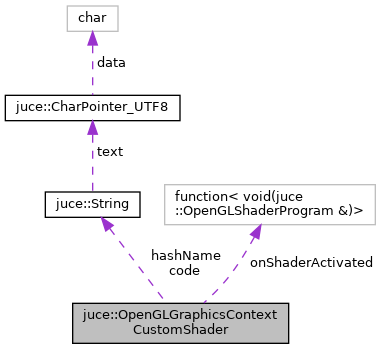Used to create custom shaders for use with an openGL 2D rendering context. More...
#include <juce_OpenGLGraphicsContext.h>

Public Member Functions | |
| OpenGLGraphicsContextCustomShader (const String &fragmentShaderCode) | |
| Creates a custom shader. More... | |
| ~OpenGLGraphicsContextCustomShader () | |
| Destructor. More... | |
| Result | checkCompilation (LowLevelGraphicsContext &) |
| Attempts to compile the program if necessary, and returns an error message if it fails. More... | |
| void | fillRect (LowLevelGraphicsContext &, Rectangle< int > area) const |
| Applies the shader to a rectangle within the graphics context. More... | |
| const String & | getFragmentShaderCode () const noexcept |
| Returns the code that was used to create this object. More... | |
| OpenGLShaderProgram * | getProgram (LowLevelGraphicsContext &) const |
| Returns the program, if it has been linked and is active. More... | |
Public Attributes | |
| std::function< void(OpenGLShaderProgram &)> | onShaderActivated |
| Optional lambda that will be called when the shader is activated, to allow user code to do setup tasks. More... | |
Private Attributes | |
| String | code |
| String | hashName |
Used to create custom shaders for use with an openGL 2D rendering context.
Given a GL-based rendering context, you can write a fragment shader that applies some kind of per-pixel effect.
@tags{OpenGL}
| juce::OpenGLGraphicsContextCustomShader::OpenGLGraphicsContextCustomShader | ( | const String & | fragmentShaderCode | ) |
Creates a custom shader.
The shader code will not be compiled until actually needed, so it's OK to call this constructor when no GL context is active.
The code should be a normal fragment shader. As well as the usual GLSL variables, there is also an automatically declared varying vec2 called "pixelPos", which indicates the pixel position within the graphics context of the pixel being drawn. There is also a varying value "pixelAlpha", which indicates the alpha by which the pixel should be multiplied, so that the edges of any clip-region masks are anti-aliased correctly.
| juce::OpenGLGraphicsContextCustomShader::~OpenGLGraphicsContextCustomShader | ( | ) |
Destructor.
| Result juce::OpenGLGraphicsContextCustomShader::checkCompilation | ( | LowLevelGraphicsContext & | ) |
Attempts to compile the program if necessary, and returns an error message if it fails.
| void juce::OpenGLGraphicsContextCustomShader::fillRect | ( | LowLevelGraphicsContext & | , |
| Rectangle< int > | area | ||
| ) | const |
Applies the shader to a rectangle within the graphics context.
|
inlinenoexcept |
Returns the code that was used to create this object.
| OpenGLShaderProgram* juce::OpenGLGraphicsContextCustomShader::getProgram | ( | LowLevelGraphicsContext & | ) | const |
Returns the program, if it has been linked and is active.
This can be called when you're about to use fillRect, to set up any uniforms/textures that the program may require.
|
private |
|
private |
| std::function<void (OpenGLShaderProgram&)> juce::OpenGLGraphicsContextCustomShader::onShaderActivated |
Optional lambda that will be called when the shader is activated, to allow user code to do setup tasks.